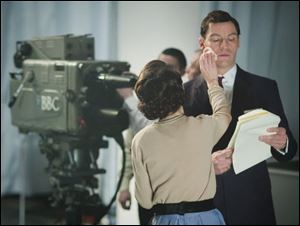
Ticking away
'The Hour' mixes mystery with moody on BBC America
8/13/2011
Dominic West, of ‘The Wire’ fame, plays a 1950s newsman in the BBC America series ‘The Hour.’
BEVERLY HILLS, Calif. -- BBC America's The Hour mixes mystery with the moody, period drama of Mad Men and a backdrop from Broadcast News. And stirs -- slowly.
The show, premiering 10 p.m. Wednesday, is an admittedly odd concoction that begins in a fog of confusion that doesn't clear for about 20 minutes. Once the pieces start coming together, it's clear that The Hour is a politically tinged murder-mystery, a character-driven workplace drama (with a romantic triangle) and a period piece about the early days of TV news in England in the 1950s.
Dominic West (The Wire) stars as Hector Madden, a charismatic news anchorman who can't seem to look into the correct camera at the right time. A critic describes The Hour and his anchoring as "like watching the car you've always dreamed of being driven by a man who's never sat behind the wheel."
Hector is married but flirts with ambitious producer Bel Rowley (Romola Garai, Atonement), who is the object of the affection of reporter Freddie Lyon (Ben Whishaw, Brideshead Revisited), who dislikes Hector because he got the job Freddie wanted, potentially the girl Freddie wants, and because Hector is not all that skilled at asking questions.
Freddie is really the heart of The Hour. He's a more rascally Clark Kent, complete with tousled, dark hair. His is the first face we see and the story is told mostly from his point of view. Freddie investigates the murder that occurs in the premiere and tangles with a creepy co-worker (Burn Gorman, Torchwood). He even inspires the name of the new news program, The Hour, despite the ill opinion of one of the network executives.
"It has to be the hour you can't miss, the hour you have to see," Freddie says during a job interview. "Putting real journalists in front of the camera is sending out the message you take the news seriously."
The exec interviewing him disagrees. He's more interested in an attractive presenter and as-perfect-as-possible aesthetics, complaining about seeing a boom microphone in a frame of film, which Freddie defends, calling it "the mechanics of how we bear witness."
The Hour has a political/historical backdrop that may prove confusing to younger American viewers -- the Suez Canal crisis of 1956 -- and the show also plays with gender roles, with Bel getting the producer job on The Hour, making her a mid-century version of Holly Hunter's Broadcast News character. Unfortunately, writer Abi Morgan does the character no favors, introducing her as weak and unwilling to tell Freddie that he's been passed over for the anchor job before his interview for a position on The Hour.
The Hour looks fantastic, but it moves at a snail's pace that's sure to irk impatient viewers. It debuts as the first entry in BBC America's weekly hourlong British drama time slot, dubbed "Dramaville" (Luther returns in this time period on Sept. 28 when The Hour ends.)
Comparisons to Mad Men are inevitable, but the show's creator bristles at them.
"I adore Mad Men, and I think it's a genius show," Morgan said at a BBC America press conference last month, "but it's a bit of a bum steer for us because ultimately we're ... a political thriller, and I think you get that pretty quickly in episode one that that's what the show is."
Executive producer Derek Wax agreed.
"We felt that post-war Britain and this extraordinary year of 1956 was rich and resonant enough to have its own dramatic flavor," he said. "It was quite different from 1960 in the advertising world. We do open in quite a drab, postwar world of rationings that just finished."
The Block News Alliance consists of The Blade and the Pittsburgh Post-Gazette. Rob Owen is a staff writer for the Post-Gazette.